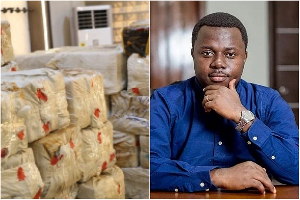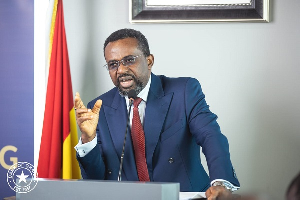Joseph Yao Hotor, the General Secretary of the Communication Workers Union (CWU) has said the introduction of AI and other technologies that result in heavy job cuts would be opposed.
Millions of jobs have been placed on the line with rise in adoption of artificial intelligence (AI) and other assistive technologies, and the General Secretary said the Union faced “significant challenges,” as the entire job clusters were being levelled.
Mr. Hotor raised the objection in an address at the eighth quadrennial delegates conference of the Communication Workers Union in Ho and was on the theme “The Impact of Artificial Intelligence on the Future of Work: The Role of the Union.”
He said that while the Union appreciated the prospects of new technology, jobs within the sector needed to be kept intact.
“The loss of projects and resulting redundancies, these have led to a decline in our membership and difficulty in organising particularly with remote work arrangements. American Towers Corporation, Ghana, Ericson AB, Ghana, and Prime and Infrastructure Engineering have all been affected.
“The union took note when metro TV laid off about 200 employees as part of restructuring efforts during the switch from analogue to digital broadcasting. So, it was on TV Africa. During the period, the Union had seen sizable number of its members become redundant – A trend driven by the rapid evolution of technology.
“While the union fully supports technological progress, it strongly objects to the introduction of technologies that would result in job loss and displacement of workers,” he stated.
The General Secretary said the Union would work with stakeholders to ensure workers-maintained relevance through the times, adding that committed investments in education and skills training should be considered by the governments, worker unions and organisations as forward interventions.
“It is very crucial for Unions, industries, and governments to adopt and prepare for these changes by investing in education, retraining and upscaling programmes. These would enable workers to transition into new roles and take advantage of the opportunities presented by AI and automation. These strategies are necessary for a just technological transition,” he said.
Mr. Hotor noted “tireless efforts” by the Trade Union Congress (TUC) at reviewing the nation’s Labor Law and said it should need provisions for the regulation of job shedding technologies.
He further said the Union would partner the Communications Ministry in “investigating the impact of emerging technologies and develop innovative solutions to protect and create new job opportunities, ensuring a secure and prosperous future for workers.”
Madam Vida Quansah, National Chairperson of the Union was of hope that the Conference would position the Union to “capitalise on the benefit of existing technologies and stay ahead of the curves.”
Madam Ursula Owusu-Ekuful, the Communications Minister, in a speech read for her, gave the assurance that the National AI Development Strategy developed recently would provide the needed guidance and that an ethical AI framework was being designed.
Dr. Yaw Baah, the Secretary General of the Trade Union Congress, said the AI revolution should not inspire fear and uncertainty, and affirmed commitment to ensuring the crucial labour law would receive the needed attention and support.
Business News of Thursday, 27 June 2024
Source: GNA













